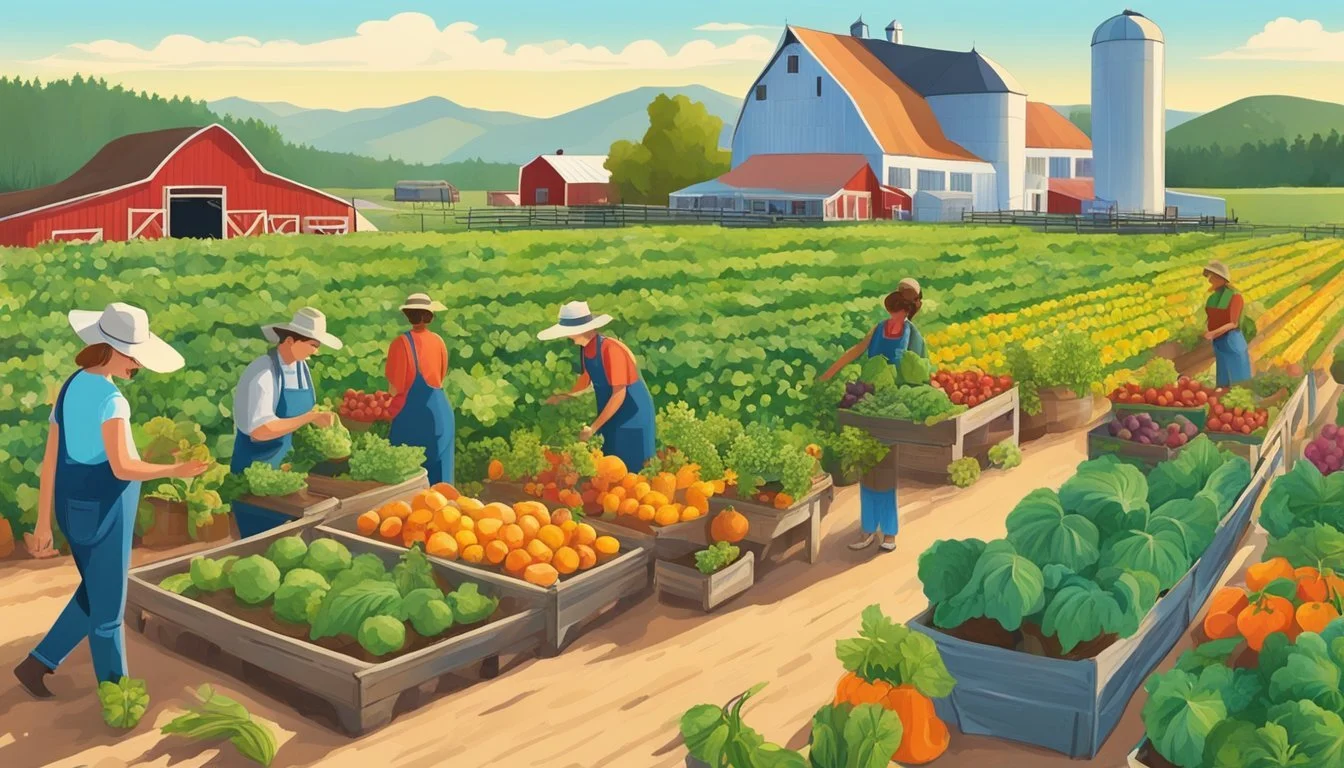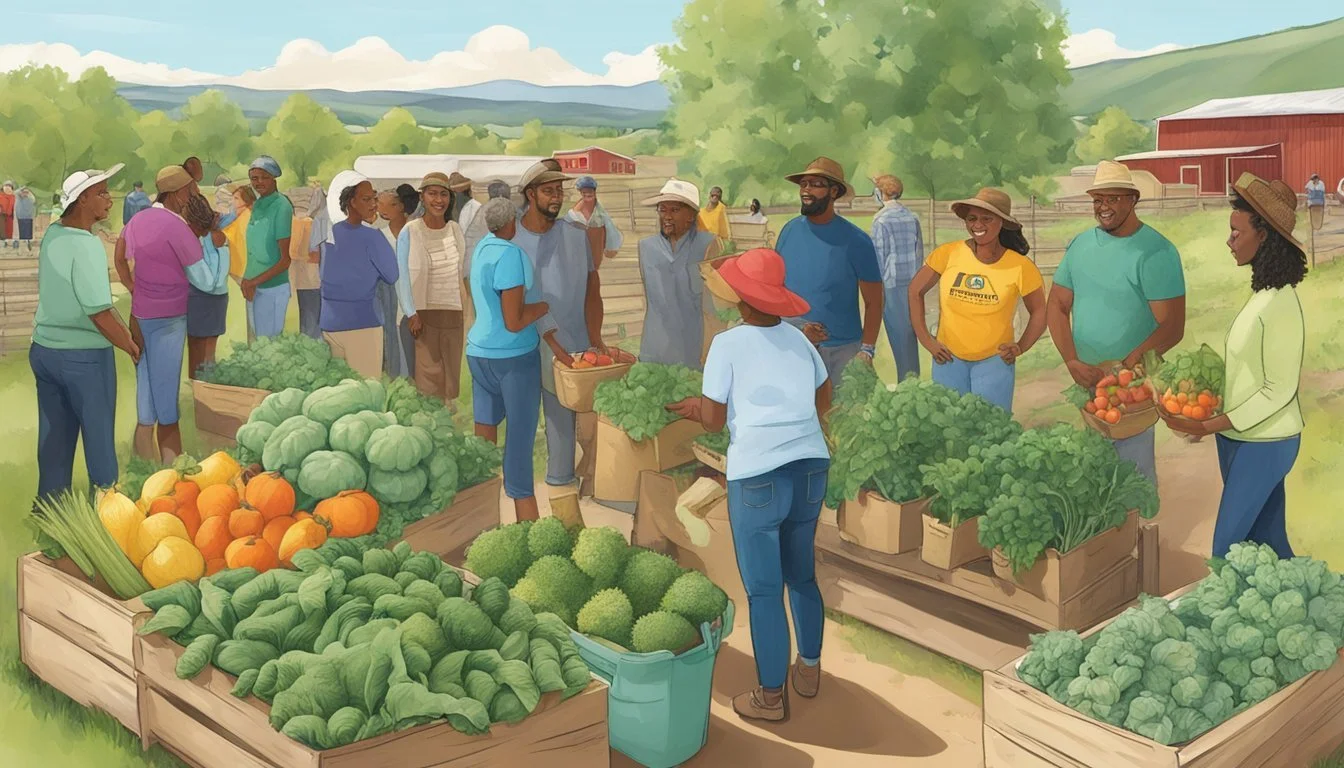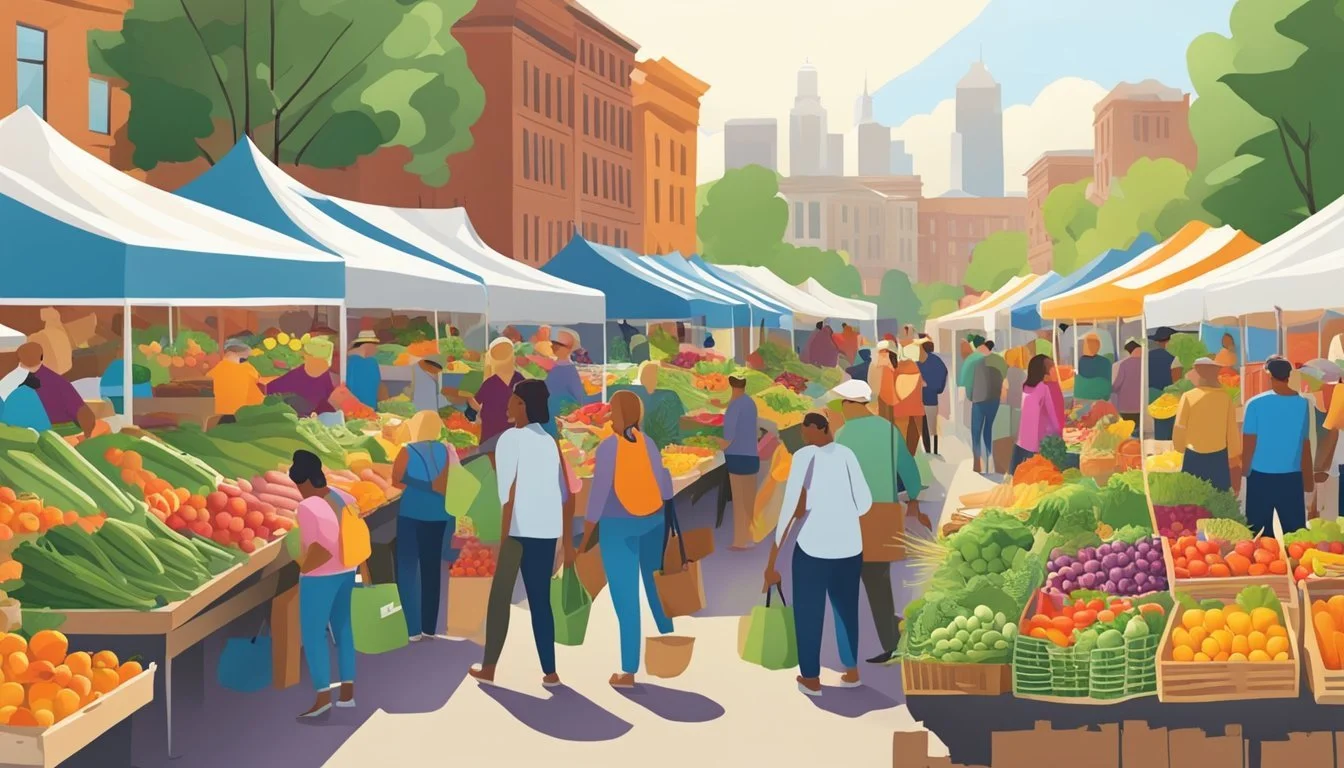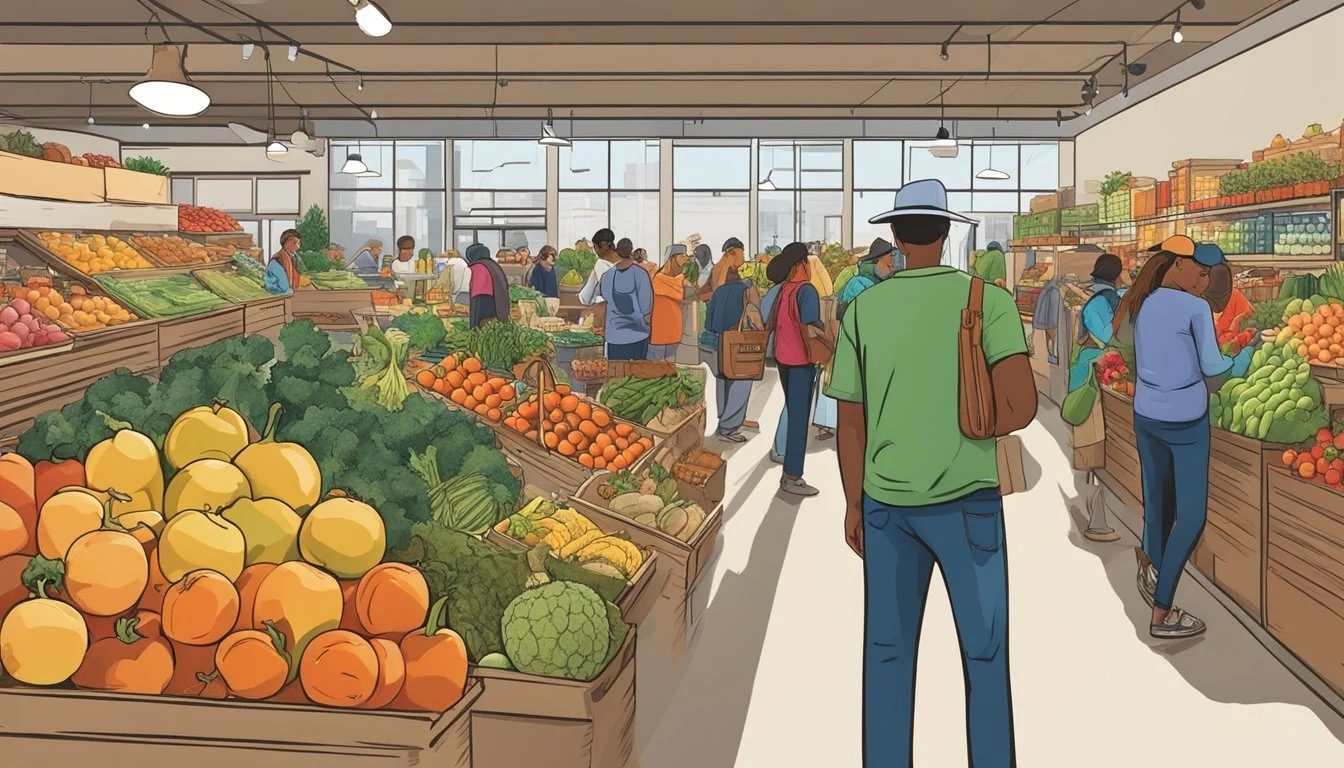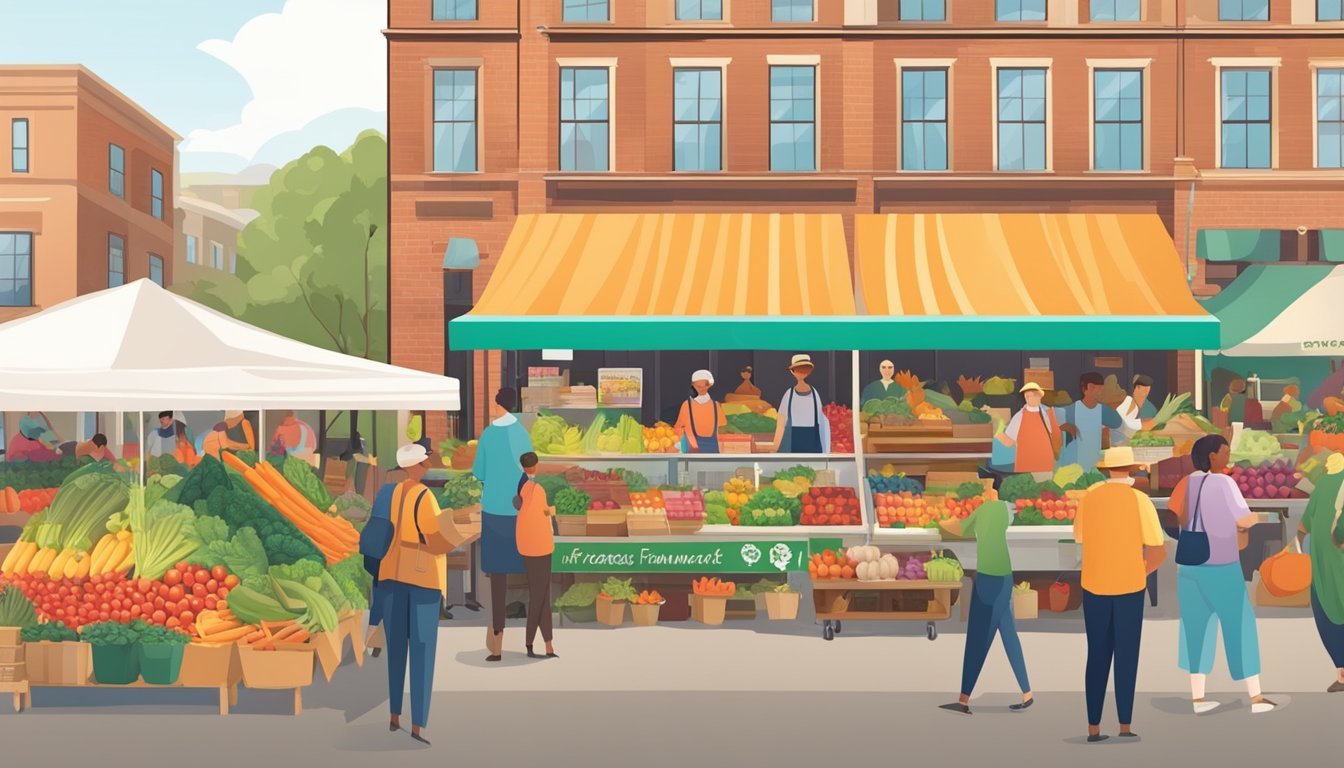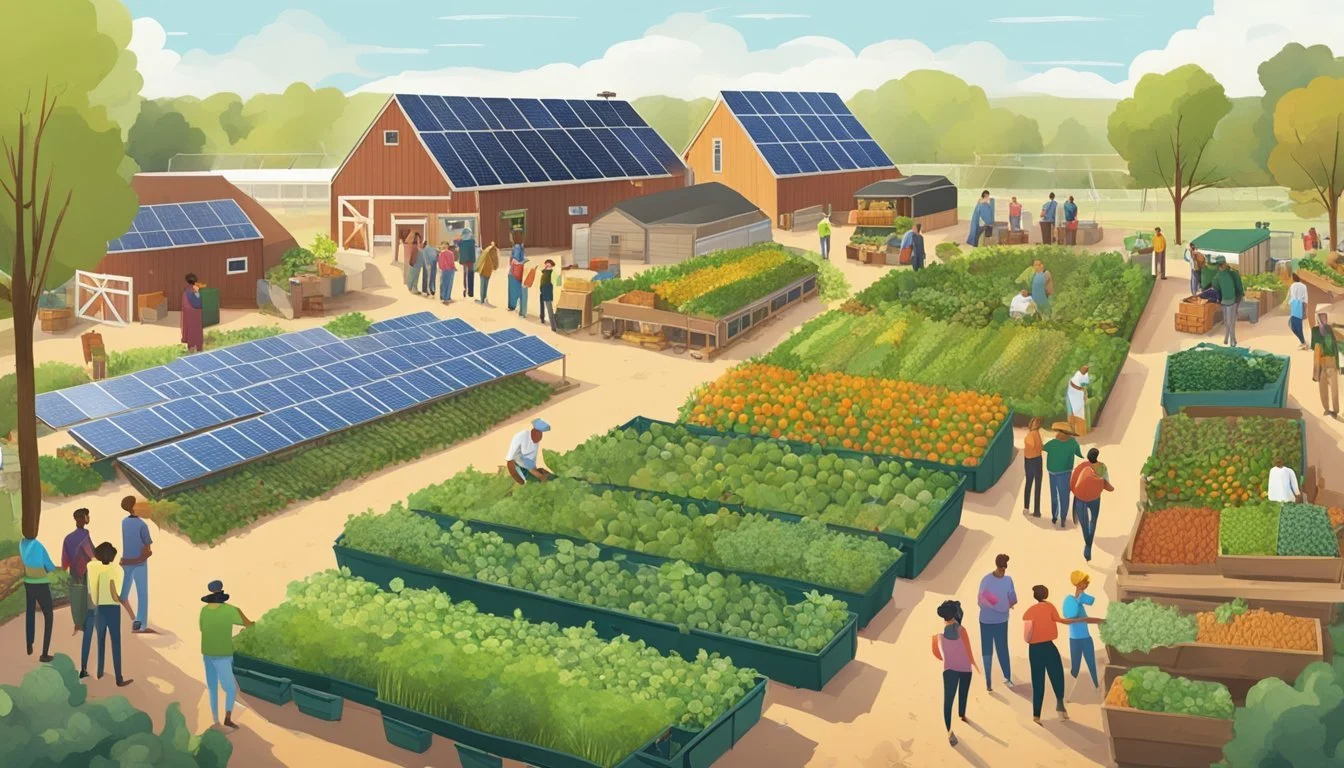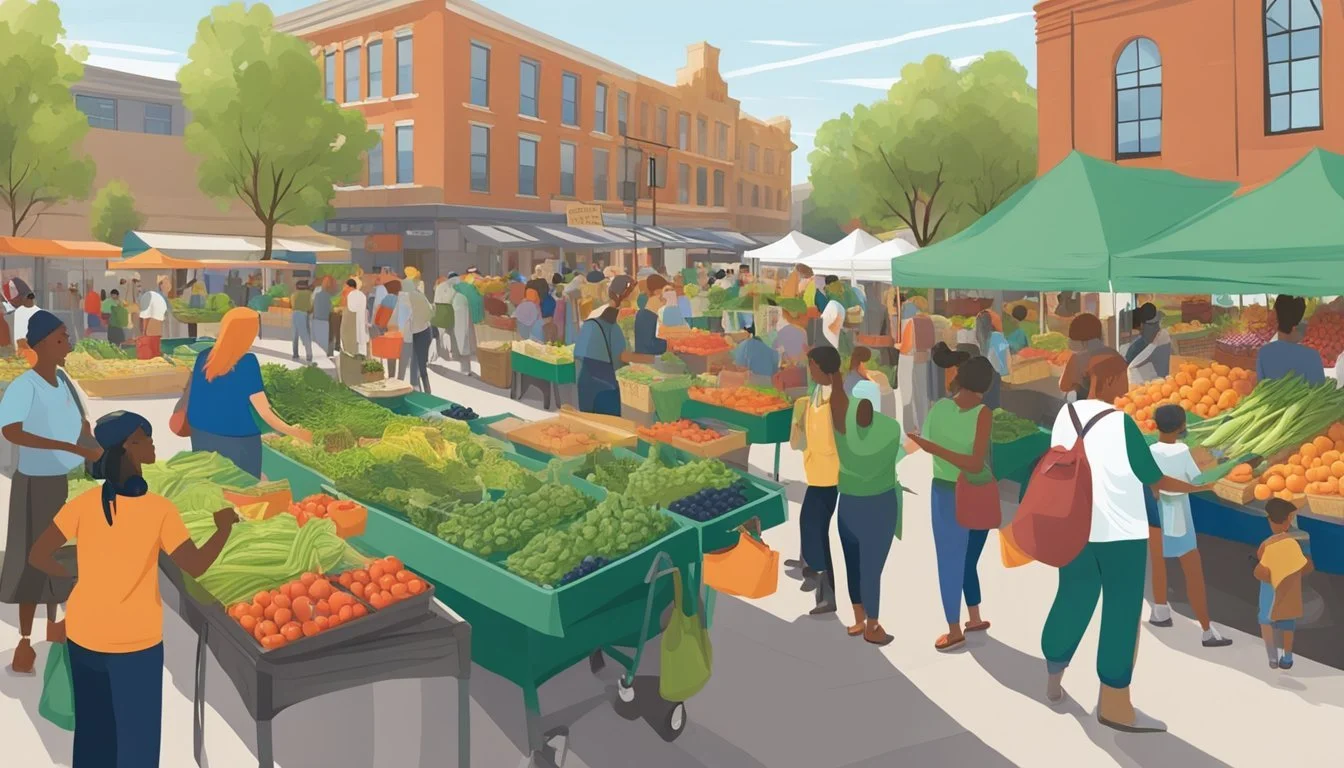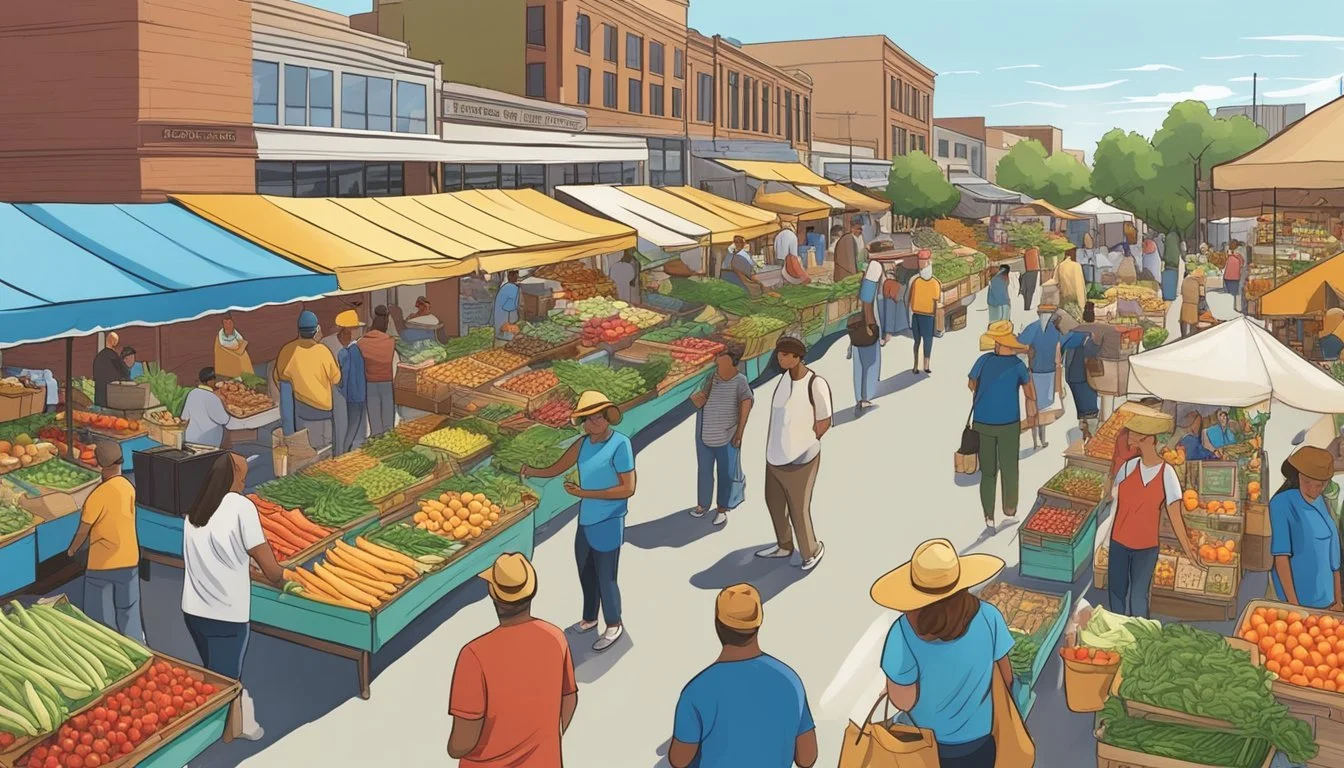Community Supported Agriculture in Denver, CO
A Guide to Local CSAs
Community Supported Agriculture, commonly referred to as CSA, has taken root in Denver, Colorado, offering residents a way to engage directly with local farms. A CSA is a model in which consumers buy shares of a farm's harvest in advance, typically receiving a portion of the produce throughout the growing season. This arrangement allows consumers to enjoy fresh, local produce while supporting farmers financially at the start of their growing season.
Denver's CSA programs vary in size and scope, from small operations like the Denver Botanic Gardens Chatfield Farms CSA, which started with just an acre and 55 shares, to larger endeavors serving hundreds of members with diverse arrays of produce. The city and surrounding areas possess a vibrant agricultural community with a commitment to sustainable farming and fostering a connection between the farm and table.
CSA members in Denver relish the benefits of farm-fresh food while participating in a food system that prioritizes local economies, environmental health, and nutritional well-being. The programs often allow for a deeper understanding of where food comes from and the challenges associated with production. By investing in CSAs, Denver residents help ensure that local farmers can continue to provide the community with fresh, high-quality produce.
History and Principles of CSA in Denver, CO
Community Supported Agriculture (CSA) in Denver has evolved significantly since its introduction, with the aim of connecting the community to their food sources.
Origins and Growth
The concept of CSA began to take root in Denver with initiatives such as the Denver Botanic Gardens Chatfield Farms' CSA, which was established in 2009 with support from Kaiser Permanente. Initially, the project spanned 1 acre with 55 shares made available to the public. As of the latest figures, it has expanded significantly to occupy 7 acres of land, offering 325 shares, allowing for a wider distribution of fresh produce.
Key Principles of CSA
The main tenet of CSA in Denver revolves around a partnership between farmers and the community, which is demonstrated through the pre-purchase of produce shares. This model ensures that:
Farmers have a secured budget for their operating costs at the beginning of the growing season.
Consumers, as shareholders, enjoy regular allotments of fresh, locally grown produce, typically from May through November.
Additionally, the CSA programs often extend into educational programs that help members understand agricultural processes and the importance of sustainable farming practices. Community engagement programs and events at places like Chatfield Farms serve to educate and connect Denver residents with their food and the land it comes from.
Benefits of Joining a CSA
Joining a Community Supported Agriculture (CSA) program in Denver offers a myriad of benefits ranging from health advantages to positive environmental impact and reinforcing community ties. This approach not only fosters solidarity among community members but also bolsters a connection to regenerative farming practices.
Health Advantages
Community Supported Agriculture can greatly benefit an individual's health. Members receive weekly shares of fresh, often organic produce that is local and seasonal. This direct farm-to-table supply chain ensures that the food is nutrient-dense and often picked at the peak of ripeness, which can lead to a more balanced and healthful diet.
Freshness: Vegetables and fruits from CSAs are renowned for their freshness, as they travel a short distance from farm to consumer.
Variety: Members are exposed to a wider variety of produce, often including heirloom or less common varieties, which can diversify one's diet.
Environmental Impact
CSAs in Denver support sustainable and regenerative farming methods that minimize the carbon footprint and promote soil health. By participating, community members directly contribute to:
Reduced Transport: Buying local reduces the need for long-distance food transport, which lowers greenhouse gas emissions.
Regenerative Practices: Many CSAs utilize methods that replenish the soil, conserve water, and enhance biodiversity, making each purchase an investment in environmental health.
Community Building
A CSA embodies the principle of solidarity economy, where community members support local farmers, thereby ensuring that the local agriculture thrives. This solidarity is palpable as it:
Strengthens Connections: Consumers engage directly with those who grow their food, forging relationships and understanding the farming process.
Economic Support: Joining a CSA provides financial stability for farmers, allowing them to focus on quality and sustainable practices without the undue pressure of market volatility.
Local CSA Farms and Organizations
In Denver, Colorado, numerous CSA farms and organizations offer fresh, locally grown produce to community members through subscriptions. These farms not only foster direct relationships between consumers and producers but also enable community members to partake in sustainable agricultural practices.
Sprout City Farms
Sprout City Farms operates with a mission to grow food, farmers, and community through urban agriculture. They manage multiple locations including the Mountair Park Community Farm. Participants can receive weekly shares of produce grown with organic practices, while also engaging in various educational programs.
Denver Botanic Gardens Chatfield Farms
Denver Botanic Gardens Chatfield Farms oversees a thriving CSA with a rich array of produce spanning over 7 acres. Members are provided with weekly shares and the opportunity to involve themselves in a community that values sustainable food systems. This CSA started with support from Kaiser Permanente and has grown significantly since its inception.
Delaney Community Farm
At Delaney Community Farm, they emphasize organic farming methods to produce a diverse selection of vegetables and fruits. This CSA supports not just the local community but also provides refugee farmers with agricultural opportunities, thereby enhancing the cultural and agricultural fabric of Denver.
Denver Green School Community Farm
The Denver Green School Community Farm partners with Sprout City Farms to cultivate an educational environment alongside their farming initiatives. They offer CSA shares and place a strong educational focus on sustainable agriculture, inviting school participation to foster early awareness and involvement in local farming.
Seasonal Operations
In Denver, CO, CSAs adapt their activities to the region’s distinct seasons, focusing on preparation in spring, peak operations in summer, and diversified tasks in the colder months.
Preparation for Spring Planting
Spring signals the start of the growing season, and CSA farmers meticulously ready their fields. They begin by testing soil quality and enriching the ground with organic matter to ensure optimal health for the crops. Farmers also strategize their crop rotations and start seeding indoors to prepare for transplanting once the threat of frost has passed.
Summer Harvesting
Summer brings the peak of the harvest season, with farmers working long days to gather the yields at their prime freshness. CSAs in Denver often encourage shareholder participation during this time. Daily routines involve:
Irrigation: Efficient systems are crucial to combat the summer heat.
Weeding: Regular maintenance helps prevent competition for resources.
Picking: Timely harvesting ensures produce is at its peak for weekly shares.
Autumn and Winter Activities
Even as temperatures drop, CSA operations continue. The autumn season often includes the harvesting of late crops like pumpkins and root vegetables. Farmers also plant cover crops to protect and nourish the soil. Winter is less intense but still active, involving planning for the next year, repairing equipment, and participating in educational programs to stay updated on sustainable practices.
Educational Initiatives
Community Supported Agriculture (CSA) programs in Denver embrace educational initiatives that focus on sustainable agriculture and community engagement. They serve as valuable platforms for experiential learning about food cultivation and healthy eating.
On-Farm Workshops and Demos
Denver's CSAs frequently host on-farm workshops and cooking demonstrations. Cultiva, a program operated by Denver Botanic Gardens, includes workshops that teach sustainable farming practices and food preparation techniques. Attendees gain hands-on experience in everything from planting seeds to preparing farm-to-table dishes. Such workshops often culminate in cooking demonstrations, wherein participants learn how to turn their freshly harvested produce into nutritious meals.
School Programs and Youth Involvement
Many CSAs prioritize youth education through school programs. They introduce students to agriculture and healthy eating habits early on. For instance, Sprout City Farms partners with Denver Green School to integrate farming into the school's curriculum. This innovative partnership provides students with direct exposure to an operational one-acre farm. Additionally, as part of their community outreach, some CSAs participate in or run their own school food pantry programs that ensure students and families from low-income communities have access to fresh, local produce. These educational programs aim to cultivate a new generation of informed consumers and potential future farmers.
Community Engagement and Support
In Denver, CO, Community Supported Agriculture (CSA) programs actively foster community engagement and offer support via volunteer initiatives and food access programs. These efforts contribute to the sustainability and vitality of local farm operations while improving food security in the community.
Volunteer Opportunities
CSA programs in Denver encourage community members to participate in volunteer days. These opportunities allow individuals to contribute labor to farming activities, learn agricultural practices, and support the mission of the nonprofit organizations that often run these CSAs. Volunteers play a crucial role, assisting with planting, harvesting, and distribution tasks, thereby strengthening the connection between consumers and their food sources.
Food Access Programs
Food access is a key component of Denver's CSA programs. To support the community, these programs partner with government food assistance initiatives such as SNAP (Supplemental Nutrition Assistance Program) and WIC (Women, Infants, and Children). By doing so, they ensure that fresh, locally grown produce reaches a broader audience, including underprivileged families. They effectively address food deserts and make nutritious food more accessible, empowering community members through healthier food choices.
Variety of Produce and Products
Denver's CSA programs bring a cornucopia of fresh, locally-grown produce and products to the community. Members can enjoy seasonal selections that promote sustainable farming and support local agriculture.
Vegetables and Herbs Offering
CSAs in Denver offer an abundant variety of vegetables spanning from leafy greens to root vegetables. Members might receive staples such as lettuce, tomatoes, peppers, and cucumbers, as well as specialty items like kale, chard, and heirloom varieties. Herbs are equally diverse, providing fresh flavors such as basil, cilantro, thyme, and parsley that can transform any meal.
Fruit and Flower Selection
Beyond vegetables, many CSAs offer a fruit share that includes locally grown fruits such as apples, peaches, and berries. One notable provider is Ela Family Farms, known for their variety of organic fruit options. The inclusion of flowers is an added delight, with assortments that may consist of bright sunflowers, fragrant lavender, and a rotating mix of seasonal blooms that bring beauty to any home.
Meat and Dairy Availability
For those interested in local, pasture-raised meat products and fresh dairy, Denver's CSA options are diverse. Members can often find a selection of beef, pork, poultry, and sometimes even lamb and bison (What wine goes well with bison?). The dairy offerings usually include fresh milk, artisanal cheeses, and sometimes yogurts and creams, all of which are sourced from local farms committed to animal welfare and natural processing methods.
Membership and Shareholder Information
In Denver, Colorado, becoming a CSA shareholder means entering a mutually beneficial partnership with local farms. Shareholders support the farms' production costs upfront by purchasing shares, and in return, they receive a portion of fresh produce throughout the growing season.
Types of Shares
CSAs in Denver offer different types of shares to accommodate various household sizes and preferences. Shares typically include a weekly delivery or pickup of vegetables, with some CSAs offering additional products like fruits, honey, and artisan goods. Most CSAs also provide a weekly newsletter to keep shareholders informed and engaged.
Regular Vegetable Share: Sufficient for a small family or a couple.
Large Vegetable Share: Designed for a larger family or a group of roommates.
Fruit Share: Often an add-on to vegetable shares, when available.
Specialty Share: May include items like honey, eggs, or lavender.
Cost and Payment Options
The cost of a CSA share can vary based on the type and size of the share, as well as the specific CSA program. Some CSAs allow shareholders to pay in installments, while others may need payment in full at the beginning of the season. CSAs may offer discounts for early sign-ups or for volunteering at the farm.
Discount and Payment Assistance Programs:
SNAP (Supplemental Nutrition Assistance Program): Some CSAs accept SNAP benefits for CSA shares, making fresh food more accessible to low-income families.
WIC (Women, Infants, and Children): Select CSAs may participate in programs offering discounts to WIC families, supporting the nutrition of young children and new mothers.
Payment Method Description Full Payment Payment required upfront, sometimes at a discount Installments Divided payments throughout the season SNAP Accepted by participating CSAs WIC Discounts available at participating CSAs
Shareholders are typically responsible for understanding the inherent risks of farming, as the quantity and types of produce can vary due to weather and other factors.
Regenerative and Sustainable Practices
Community Supported Agriculture (CSA) in Denver prioritizes methods that contribute to soil health, ecosystem balance, and environmental sustainability. These practices focus on long-term benefits to both the land and the community.
Organic and Biodynamic Farming
In Denver, CSAs often incorporate organic farming techniques, abstaining from synthetic pesticides and fertilizers. An example includes the Denver Botanic Gardens Chatfield CSA, which grows produce by following organic practices. Biodynamic farming takes this a step further, emphasizing a holistic approach to agriculture. These farms often become a hub for organic vegetable farming, creating a strong foundation for the expansion of sustainability in the region.
Regenerative Agriculture Benefits
Regenerative agriculture goes beyond preserving the environment—it actively improves it. Key benefits include:
Soil Restoration: Enhanced soil fertility and structure.
Carbon Sequestration: Capturing atmospheric carbon dioxide, mitigating climate change.
Biodiversity: Supporting a variety of organisms, from microorganisms to wildlife.
These sustainable farming practices contribute not only to the regenerative capacity of the land but also to community well-being and resilience against a changing climate. As CSAs like those in Denver adopt these methods, they become part of a solution forging a path towards a greener and more sustainable future.
Local and National Impact
Community Supported Agriculture (CSA) in Denver is more than just a means of sourcing fresh produce; it is an integral part of the local economy and an expanding branch of urban agriculture. These programs connect residents with the source of their food, create jobs, and provide nutrition education.
Economic Benefits
Denver's embrace of CSA models has provided considerable economic benefits to the community. Initiatives like the Denver Botanic Gardens Chatfield Farms CSA illustrate the growth potential of such programs. Starting with 55 shares, it now supports 325 shares on a 7-acre plot, indicating a surge in both demand and local support. Funding from entities such as Kaiser Permanente, through a substantial grant, has empowered the CSA to flourish financially.
The revenue generated through CSA memberships circulates within the local economy, leading to financial stability for farmers and affordability for members. Additionally, the partnership between CSAs and educational institutions, like the Denver Green School, bolsters the market for responsibly grown local produce by facilitating a farm-to-school pipeline.
Expanding Urban Agriculture
Urban agriculture nonprofits in Denver are at the forefront of transforming underutilized city spaces into productive agricultural land. The collaborative model of CSAs contributes to this expansion, as seen with the Denver Botanic Gardens Chatfield Farms CSA. This CSA not only provides fresh, local produce but also serves as an educational resource for urban dwellers to learn about sustainable agriculture practices.
The growth of urban agriculture through CSA programs also offers numerous environmental benefits. These include reduced carbon footprint due to decreased food transport distances and improved green spaces that contribute to the city's ecological health. By integrating agriculture into the urban landscape, Denver sets a precedent for other cities contemplating similar urban agricultural initiatives.
Future Prospects
The progression of Community Supported Agriculture (CSA) in Denver hinges on novel tech applications and an informed customer base. These elements are vital for the advancement of the CSA model.
Technological Innovations
Denver's CSA programs are on the cusp of leveraging cutting-edge technology to enhance agricultural efficiency and sustainability. One focal point is regenerative farming practices, which embrace methods aimed at soil restoration and carbon sequestration. The implementation of data-driven tools aids farmers in monitoring soil health and crop yields, making informed decisions to foster long-term ecological balance. CSA providers may also utilize mobile applications for streamlined share management and real-time communication with members.
Expanding Consumer Education
Education plays a crucial role in cultivating a robust CSA community. Initiatives that underscore the importance of local, sustainable food systems foster deeper consumer engagement. CSA programs in Denver are adopting innovative strategies to educate members:
Workshops and Farm Tours: Hands-on experiences on farms that elucidate regenerative farming techniques
Online Resources: Accessible information on the nutritional and environmental benefits of CSA participation
This educational outreach is pivotal in building a discerning and dedicated customer base that appreciates the value of sustainable agriculture embedded within CSAs.

